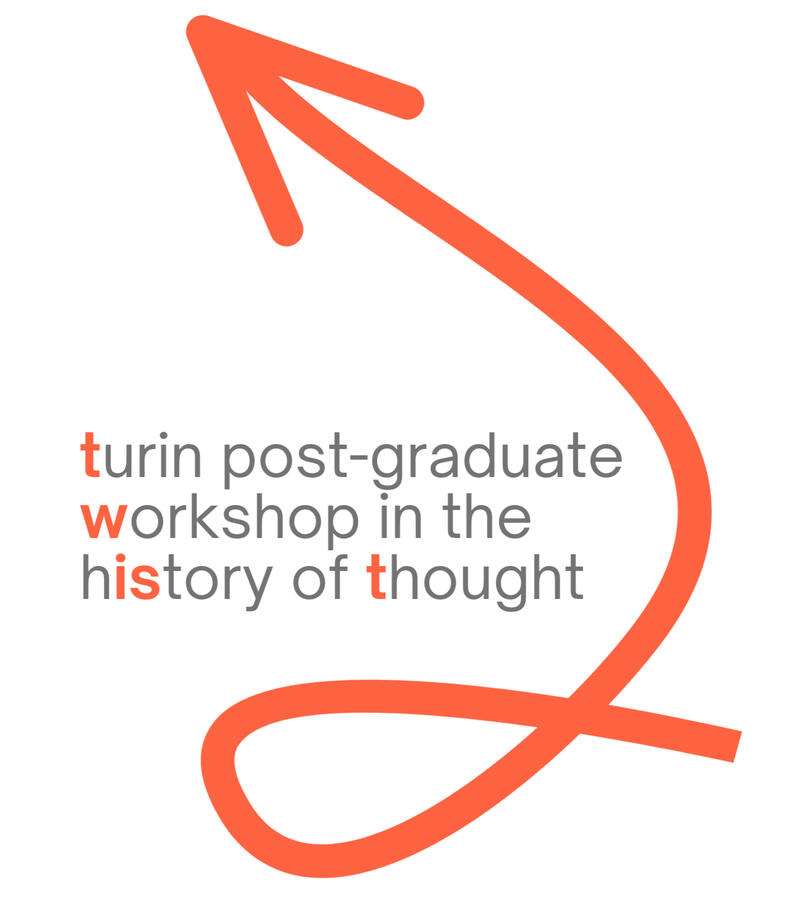
Next meeting:
01/02/2024, h15-18
Roberto Lalli (PoliTo), La diplomazia scientifica nella storiografia della scienza e della tecnologia
Caterina Zanfi (UniTo), IL'Europa filosofica e la prima guerra mondialeIn person: University of Turin, Aula di Medievale (Palazzo Nuovo, Department of Philosophy and Educational Sciences, floor 2)Online: Zoom (join!)
What is twist!?
twist! is a thematic workshop on the history of thought hosted by the University of Turin. The workshop brings together early-stage researchers and established scholars from different fields of historical inquiry. Activities focus mainly on the (Early- and Late-) Modern and Contemporary periods. The working languages are English, French and Italian.
Organizers and scientific board
The workshop is organized by the students (38th cycle) in History of Philosophical and Scientific Thought of the Northwestern Italian Philosophy Consortium (FINO) doctoral program. The scientific coordinators of the initiative are Giuseppe Cospito (University of Pavia), Paola Rumore (University of Turin) and Paolo Tripodi (University of Turin).
Twistory
The workshop was founded in 2022-23. In the first edition, it ran under the name his/tho and took the form of a work-in-progress seminar open to MA and PhD students of the University of Turin. Since the academic year 2023-24, twist! has been part of the teaching activities provided by the Northwestern Italian Philosophy Consortium doctoral program.
Upcoming sessions
This academic year, the workshop will have eight meetings in two sessions. The first session will run from November 2023 to January 2024 and will explore the theme of what is a non-standard source in the history of thought. The second session will take place from January to February 2024. It will address the geopolitical motifs that shape how philosophical and scientific communities represent themselves and their activity.
Non-standard sources in the history of thought
Nov 23, 2023-Jan 15, 2024
University of Turin and Zoom: Join the meeting!
What is a non-standard source in the history of thought? Focusing on different kinds of historical documents (e.g., translations, poems, diaries and travel reports, clandestine literature and replications of chymical experiments), the talks will highlight some nuances of this quality of 'being non-standard' for a historical source. What does the history of modern philology tell us about the history of ordinary language philosophy in the U.S.? And how does reproducing the experiments performed by sixteenth-century alchemists help us understand how mineral resources were studied (and exploited) in pre-industrialized Europe? A non-standard quality in historical sources also surfaces whenever they do not meet the gold standard of knowledge production in a given historical period. Why Early-Modern philosophy was cast in verses from time to time and circulated in clandestine trajectories? And what is the relationship between the production of natural histories in Early-Modern Europe and the development of natural knowledge in more remote areas of the globe at that time?
| Speaker | Title | Date | Place |
|---|---|---|---|
| Enrico Pasini | Da Anacarsi Scita a Christopher Norris: esiste davvero la poesia filosofica? | Nov 23, 2023, 17-19 | Aula di Medievale, Palazzo Nuovo (piano 2) |
| Giuseppe Pignatelli | Vivestein. Logica rinascimentale, filologia moderna e storia della filosofia del linguaggio ordinario | Nov 30 2023, 17-19 | Sala Incontri 1, Biblioteca di Filosofia, Palazzo Nuovo (piano -1) |
| Morgana Lisi | Tra spedizioni e conoscenza locale: lo studio della botanica nel mondo iberico del Settecento | Dec 12, 2023, 18-20 | Aula di Medievale, Palazzo Nuovo (piano 2) |
| Francesco Luzzini | Dalla miniera al laboratorio: la replicabilità dei processi minerali tra filosofia naturale e pratica alchemica | Jan 11, 2024, 17-19 | Aula di Medievale, Palazzo Nuovo (piano 2) |
| Natalia Zorrilla Sirlin | Émilie Du Châtelet's clandestine philosophy | Jan 15, 2024, 17-19 | Sala Incontri 1, Biblioteca di Filosofia, Palazzo Nuovo (piano -1) |
Geopolitiche delle rappresentazioni intellettuali
Jan 25-Feb 12, 2024 | University of Turin and Zoom
Il ciclo di tre incontri sarà dedicato ai temi e problemi che emergono dalla considerazione storiografica delle caratterizzazioni geografiche della produzione intellettuale. Ci si concentrerà su diversi casi di studio che possano esemplificare diversi gesti in relazione alla determinazione geografica. Dalla costituzione delle identità nazionali in ambito filosofico alla circolazione globale delle idee politiche ed economiche, dal ruolo svolto da attori filosofici e scientifici nella diplomazia internazionale all’analisi del fenomeno della migrazione degli intellettuali dall’Italia fascista e dalla Germania nazista.
| Speaker | Title | Date | Place |
|---|---|---|---|
| Matias X. Gonzalez Mattia Steardo | Oltre il nazionalismo? L’alterazione inter-nazionale delle parti del lavoro (Messico-Francia, XIX secolo) Illuminismo spagnolo, ispanoamericano o argentino? Sulle idee economiche di Manuel Belgrano e la difficoltà di una storia intellettuale nazionale | Jan 25, 2024, 16-19 | Sala Incontri 1, Biblioteca di Filosofia, Palazzo Nuovo (piano -1) |
| Roberto Lalli Caterina Zanfi | La diplomazia scientifica nella storiografia della scienza e della tecnologia L'Europa filosofica e la prima guerra mondiale | Feb 1, 2024, 15-18 | Aula di Medievale, Palazzo Nuovo (piano 2) |
| Erika Luciano Sander Verhaegh | tbd | Feb 15, 2024, 17-20 | Aula di Medievale, Palazzo Nuovo (piano 2) |